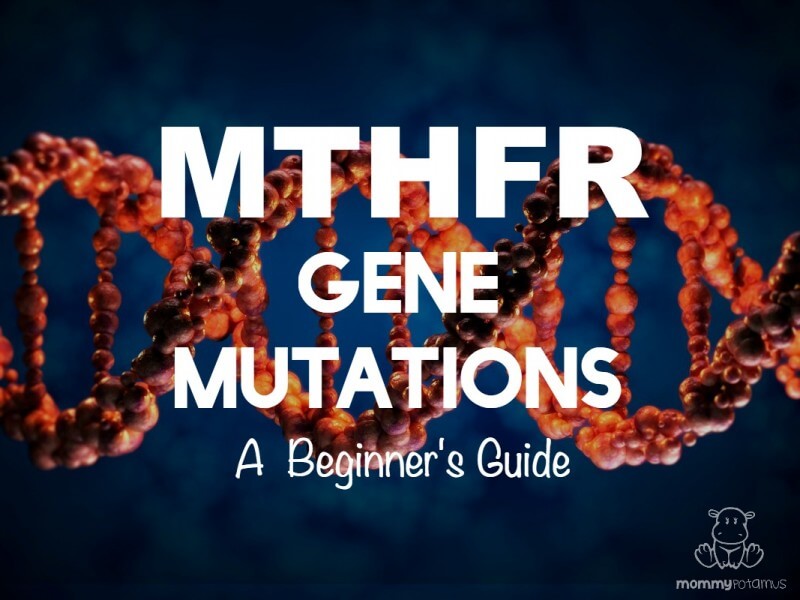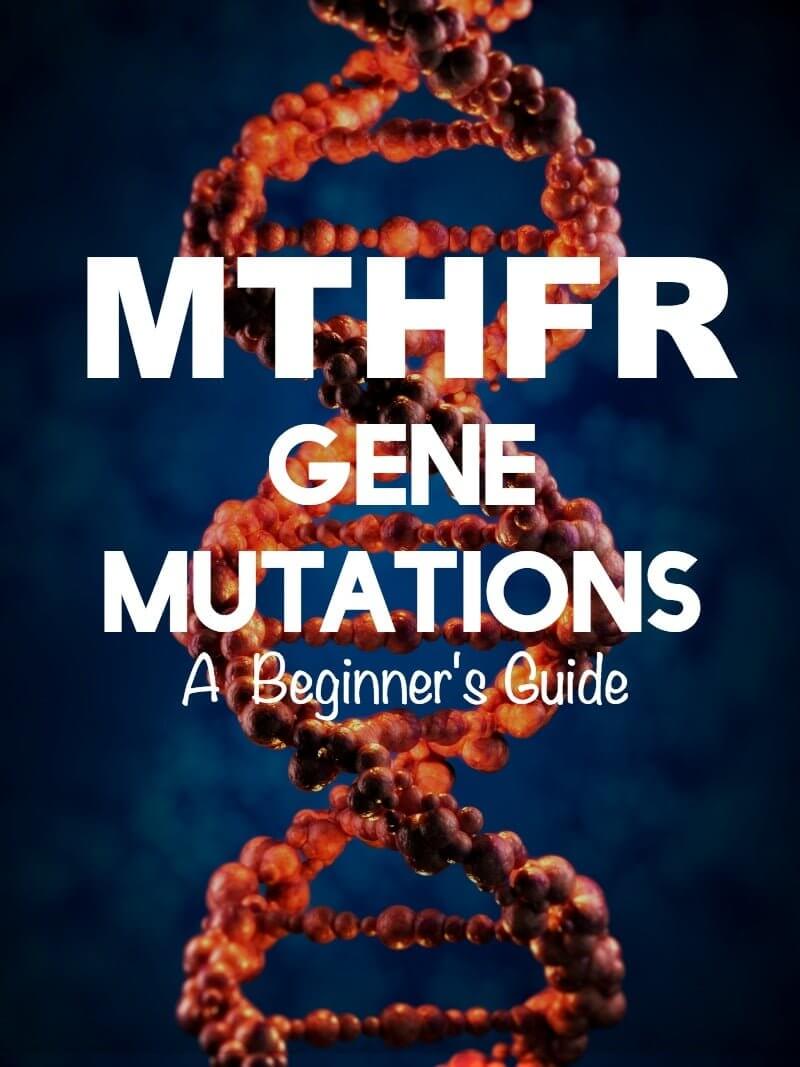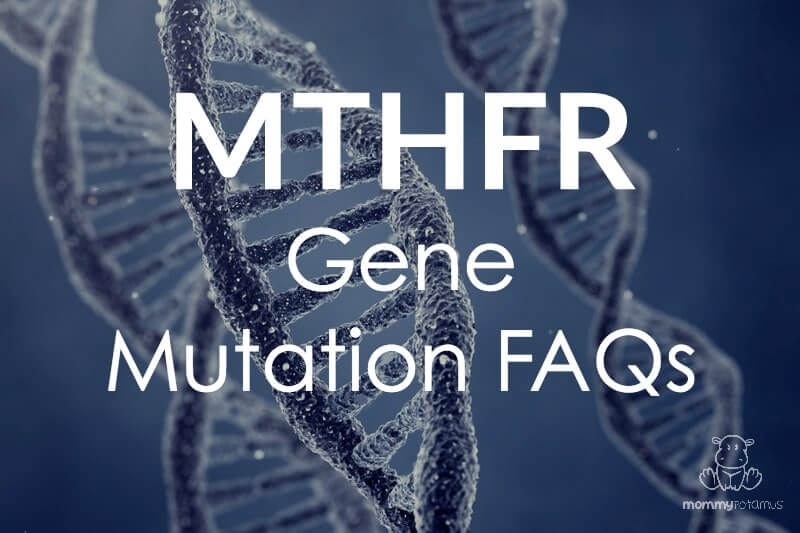
MTHFR <- No, it’s not a swear word. I’ll admit, I thought it was the first time I read it, but as it turns out it’s something much more important. MTHFR is an abbreviation for a genetic mutation that affects 30-50% of our population, although most of us don’t know whether or not we have it.
If you tuned out in high school biology and need a refresher on how genes work, here’s the deal:
Your body contains 50 trillion tiny cells, and almost every one of them contains the complete set of instructions for making you. These instructions are encoded in your DNA . . . If you imagine your DNA as a cookbook, then your genes are the recipes. (source)
So what is MTHFR, exactly?
Ahhh, good question. Before we jump in, let me just say that this “Beginner’s Guide” is simply an overview of the issue from my perspective as someone who has MTHFR. I’m not a genetic expert, but I do link to resources created by experts at the bottom of this post. Now, let’s get started . . .
Imagine one of the recipes in your DNA cookbook is for mayo, except the instructions got a little garbled and you ended up with something that is almost like mayo, but not quite. Every other dish in the cookbook that calls for mayo would be affected, right? That’s essentially what a mutation is – a slight change to the instructions that can have sometimes small, sometimes significant impacts on other recipes.
MTHFR specifically is a gene that holds the recipe for methylenetetrahydrofolate reductase – an enzyme that helps our bodies convert vitamin B9 (also known as folate) into a usable form called methylfolate. This process is called methylation.
Now, if you’re thinking, “Oh, no problem! There’s folate in my multi-vitamin,” it’s important to note that the “folate” in most foods and vitamins is folic acid, which researchers believe is harmful to those with MTHFR gene mutations. (More on that later)
What’s the big deal about MTHFR mutations?
When the MTHFR gene is functioning properly, it’s highly efficient at helping our bodies convert vitamin B9 (folate) into a usable form called methylfolate. When the gene is mutated, this capacity to convert vitamin B9 into methylfolate is reduced by 40-70%.
That’s HUGE, because converting folate into a useable form is essential for DNA synthesis and repair, neurotransmitter production, detoxification, and immune function.
Researchers are just beginning to study the connection between MTHFR mutations and different conditions, but so far it has found an association with quite a few. Here’s a short list of conditions that have been studied:
- Tongue and lip ties (Though not necessarily severe, I mention them because discovering that my children were tongue and lip tied was my first hint that I needed to be tested for MTHFR.)
- Heart disease (source)
- Alzheimer’s (source)
- Depression (source)
- Recurrent miscarriage (source)
- Asthma (source)
- Prostate cancer (source)
- Bladder cancer (source)
- Multiple Sclerosis-like symptoms (source)
Dr. Ben Lynch, who is considered one of the foremost experts in the field of MTHFR genetic mutations, has a more complete list here. (See the third paragraph for a link to additional supporting research.)

Are all MTHFR mutations the same?
No. There are over fifty types of MTHFR gene mutations . . . possibly more that have yet to be discovered. However, the two that are most commonly studied and tested for are C677T and A1298C.
Let’s look at the C677T mutation for a moment. Because we inherit one copy of each gene from our mother and father, that means that for those that have the C677T mutation there are two possibilities. They can be:
- Heterozygous – having one copy of the C677T mutation and one normal copy
- Homozygous – having two copies of the C677T mutation
According to Dr. Ben Lynch, individuals who are:
- Homozygous for C677T have an estimated 70% loss of function
- Heterozygous for C677T have an estimated 40% loss of function
There is a lot of debate about whether those with the A1298C mutation experience diminished function. Some say no, but based on what I’ve read of Dr. Lynch’s work he seems convinced that it can in certain circumstances. (source)
In cases where an individual is compound heterozygous – having one one C677T mutation and one A1298C mutation – there is an estimated 50% loss of function. (source)
Can’t we just supplement with folic acid?
Unfortunately, folic acid – which is a synthetic vitamin found in fortified foods and almost all vitamin supplements – is considered harmful for people with MTHFR mutations. Though it is easily absorbed by the body, people who have low levels of the MTHFR enzyme are not able to convert very much of it into usable form. So what happens to the unconverted folic acid? It attaches itself to the same receptors in the body used to absorb folate, effectively blocking the body’s ability to absorb any usable folate that is floating around. (source 1, source 2)
Side note: Many lab tests do not distinguish between folic acid and folate when measuring blood levels. If folic acid intake is high, the results may show an individual has adequate amounts of folate when in fact what they actually have are high levels of unusable folic acid (but very little folate).
Here’s the good news: Our DNA is not our destiny.
Really, it’s not. One of my favorite analogies for explaining why goes like this:
DNA is like a musical instrument. It’s there, but in order to make music it needs something – or someone – to play it. That something is epigenetics, which literally means “above” genetics. The epigenome is literally a second genome that plays the first like a violin, turning genes on and off according to the sheet music.
What is that sheet music, exactly? Our lives. Our choices. The food we eat. The way we interact with stress. Whether or not we get enough sleep. And for those of us with the MTHFR mutation, how we compensate for it in order to support overall function.
Here’s a real-life example: In the lecture available here, Dr. Lynch explains that certain populations have higher rates of the MTHFR mutation. Most also have higher rates of neural tube defects, which makes sense because they are a result of decreased folate status. However, one population in Italy has high rates of the mutation but very few neural tube defects. Researchers believe that nutrition and positive aspects of the environment are modulating the effects of the mutation. (Here’s a link to the study he cites)
How to get tested for MTHFR
If you have symptoms that relate to MTHFR and your doctor orders the test for you, there is a possibility that it will be covered by insurance. However, if for whatever reason the insurance company decides it is not covered, your out-of-pocket costs can be very high – sometimes over $1000. Definitely check with your insurance company and the lab you are ordering through to determine what your max cost might be.
Personally, I opted to test through 23&Me. The cost is $199, and you get more information than just MTHFR status. However, I agree with the advice Dr. Lynch gave in this interview with Wellness Mama, which is not allow yourself to get overwhelmed by all the information they provide. He suggests just starting with MTHFR (if you have the mutation), then exploring other genetic mutations if the supplements/lifestyle changes recommended don’t have the desired results.
Should children be tested?
My husband and I opted to test our two older children. (Toddlerpotamus is too young to produce enough spit for the test.) Our reasoning was that if they did have the mutation, it would be best to know so that we could take appropriate action to optimize their health.
Okay, I have the MTHFR mutation. What now?
Unfortunately, there is no “one-size-fits-all” approach to MTHFR. Supplementation with methylfolate (labeled as 5 L-MTHF or 6(S)-L-MTHF) is often recommended along with vitamin B-12 (in the form of SL methylcobalamin or hydroxycobalamin). HOWEVER, there are cases in which supplementation can cause serious side effects, especially when high doses are introduced at the beginning. This is often the case when the individual has other genetic mutations that interact with MTHFR. (source)
When I began the process of addressing my MTHFR mutation, here’s what I did:
- I educated myself as much as possible on the subject. Some of the resources I found most helpful are:
- This video from Dr. Ben Lynch. It’s long, but a very good starting point for understanding MTHFR. You have to sign up for his Seeking Health newsletter to access it. He doesn’t send emails via this newsletter very often.
- I also signed up for Dr. Lynch’s other email newsletter that is available via MTHFR.net. It starts off with very helpful beginner info, including what he calls his “safe and sane” way to supplement.
- Wellness Mama has a great podcast interview with Dr. Lynch posted here.
- Chris Kresser also has a couple of helpful podcasts: “Methylation 101” can be found here. “Methylation: What is it and why should you care?” can be found here. Personally, I found that hearing different people explain MTHFR and methylation from their different perspectives helped me understand it better overall.
2. I sought the guidance of a MTHFR literate healthcare practitioner before beginning supplementation. Though it’s not a complete list, you can find practitioners who have completed some form of training here. In my experience, the level of knowledge can vary widely from practitioner to practitioner, so I would personally do some additional research and/or interview the provider before beginning a protocol.
Next in this series, I’ll cover some of the most frequently asked questions about MTHFR gene mutations.
This article was medically reviewed by Madiha Saeed, MD, a board certified family physician. As always, this is not personal medical advice and we recommend that you talk with your doctor.




